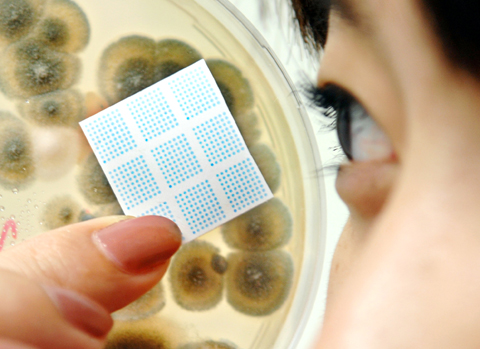A thumb-sized chip could be the answer to people who suffer from indoor pollutants.
The Environmental Protection Administration (EPA) yesterday unveiled the world’s first DNA chip capable of detecting 21 types of harmful and allergenic bacteria within three to five days. Measuring 8mm by 7mm, the electrical hybridization chip is smaller than a NT$1 coin. The chip contains 21 probes, each containing the DNA elements of the 21 bacteria considered dangerous to humans.
Developed by the EPA and National Cheng Gung University, the chip can detect harmful air-borne bacteria, such as aspergillus flavus, aspergillus versicolor and chaetomium globosum, which are known to cause allergic reactions such as coughing, sneezing and runny noses.

PHOTO: CNA
EPA Environmental Analysis Laboratory Chief Hung Wen-tsung (洪文宗) said the chip has 98 percent accuracy, adding that the EPA was in the process of applying for a patent.
Starting in May, 30 elementary schools and kindergartens will be tested for mold pollution using the device.
Hung said that a petri dish is placed in a sampling pump to collect an air sample for a period of between 10 minutes and 20 minutes.
The cultural sample with the bacteria particles is then compared with strains of pathogen present in various bacteria. A matching strain indicates the presence of such bacteria in the air, he said.
The entire process can be completed within three to five days, he said, adding that this was a major improvement from a previous model, developed in 2008, which could only detect 10 target bacteria in one month.
The chip costs about NT$100 and can be reused, Hung said.
While the chip does not provide qualitative information such as the density of bacteria in the air, such a function “is our goal for the future,” Hung said.
The EPA said the average person spends between 80 percent and 90 percent of his or her time indoors and household allergens have become one of the biggest problems for urban dwellers.
Early detection of harmful bacteria in the air could alert schools and teachers of the need to clean up their classrooms, especially often-ignored corners where mold accumulates, Hung said.

Alain Robert, known as the "French Spider-Man," praised Alex Honnold as exceptionally well-prepared after the US climber completed a free solo ascent of Taipei 101 yesterday. Robert said Honnold's ascent of the 508m-tall skyscraper in just more than one-and-a-half hours without using safety ropes or equipment was a remarkable achievement. "This is my life," he said in an interview conducted in French, adding that he liked the feeling of being "on the edge of danger." The 63-year-old Frenchman climbed Taipei 101 using ropes in December 2004, taking about four hours to reach the top. On a one-to-10 scale of difficulty, Robert said Taipei 101

Nipah virus infection is to be officially listed as a category 5 notifiable infectious disease in Taiwan in March, while clinical treatment guidelines are being formulated, the Centers for Disease Control (CDC) said yesterday. With Nipah infections being reported in other countries and considering its relatively high fatality rate, the centers on Jan. 16 announced that it would be listed as a notifiable infectious disease to bolster the nation’s systematic early warning system and increase public awareness, the CDC said. Bangladesh reported four fatal cases last year in separate districts, with three linked to raw date palm sap consumption, CDC Epidemic Intelligence

US climber Alex Honnold left Taiwan this morning a day after completing a free-solo ascent of Taipei 101, a feat that drew cheers from onlookers and gained widespread international attention. Honnold yesterday scaled the 101-story skyscraper without a rope or safety harness. The climb — the highest urban free-solo ascent ever attempted — took just more than 90 minutes and was streamed live on Netflix. It was covered by major international news outlets including CNN, the New York Times, the Guardian and the Wall Street Journal. As Honnold prepared to leave Taiwan today, he attracted a crowd when he and his wife, Sanni,

Taiwanese and US defense groups are collaborating to introduce deployable, semi-autonomous manufacturing systems for drones and components in a boost to the nation’s supply chain resilience. Taiwan’s G-Tech Optroelectronics Corp subsidiary GTOC and the US’ Aerkomm Inc on Friday announced an agreement with fellow US-based Firestorm Lab to adopt the latter’s xCell, a technology featuring 3D printers fitted in 6.1m container units. The systems enable aerial platforms and parts to be produced in high volumes from dispersed nodes capable of rapid redeployment, to minimize the risk of enemy strikes and to meet field requirements, they said. Firestorm chief technology officer Ian Muceus said